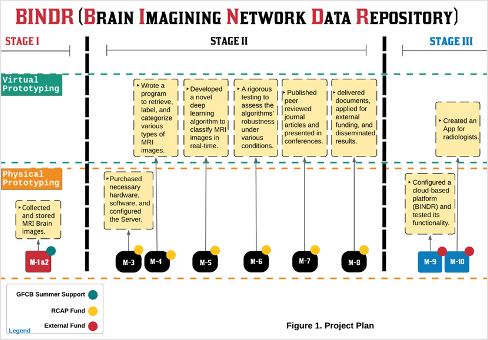Awarded Internal Grants
Innovative BINDR Project Secures RCAP Funding ($14,547)
Dr. Zhuhadar has been awarded an RCAP grant of $14,547 to support Stage I of the groundbreaking Brain Imaging Neural Disease Recognition (BINDR) initiative. BINDR aims to develop an advanced AI-powered application designed to assist radiologists in accurately classifying and detecting brain diseases using newly scanned brain images (X-ray, CT, or MRI). The project leverages cutting-edge AI algorithms to deliver precise, real-time diagnostics, filling a critical gap in medical imaging technology.
This funding will allow Dr. Zhuhadar to build a prototype that will lay the foundation for a regional, multidisciplinary research collaboration between the WKU Center for Applied Data Analytics and the University of Louisville’s Knowledge Discovery & Web Mining Lab. The project envisions a robust network of researchers, radiologists, and AI specialists, collaborating to match cutting-edge data analysis methods with the radiological needs of healthcare professionals. This strategic partnership has the potential to attract significant NSF funding and external contracts, driving research in computational neuroscience and biomedical technologies on a larger scale.

Background
Dr. Zhuhadar’s prior work, conducted in collaboration with WKU and UofL researchers, explored Brain MRI classifications, with findings published in IEEE conferences. However, the AI technology available at the time was insufficient for handling real-time image recognition on a large scale. The recent breakthrough of Deep Learning (DL) algorithms, supported by advancements in GPU technology, has transformed AI's capabilities, making BINDR's vision achievable. DL has revolutionized multiple industries, from autonomous vehicles to fraud detection, and is now set to transform medical imaging.
Significance
Medical imaging AI is projected to become a $4.7 billion market by 2027, according to industry predictions. Platforms such as the Alzheimer’s Disease Neuroimaging Initiative (ADNI) and The Cancer Imaging Archive Net (TCIA) offer large archives of medical images. However, BINDR’s distinct advantage lies in its ability to use AI algorithms to automatically classify medical images and provide a diagnostic record, revolutionizing the speed and accuracy of medical diagnoses.
Intellectual Merit
While many AI applications have been developed to detect and classify brain tumors, none operate in real-time for disease detection based on various medical images. BINDR aims to close this gap by employing convolutional neural networks (CNNs), the most effective algorithm for image classification. Dr. Zhuhadar’s work will build on the current state-of-the-art technology to create a real-time diagnostic tool, enhancing the capabilities of radiologists and advancing the field of medical AI.
This pioneering project is set to position WKU and its partners at the forefront of medical imaging innovation, offering practical solutions that could significantly impact healthcare outcomes.

